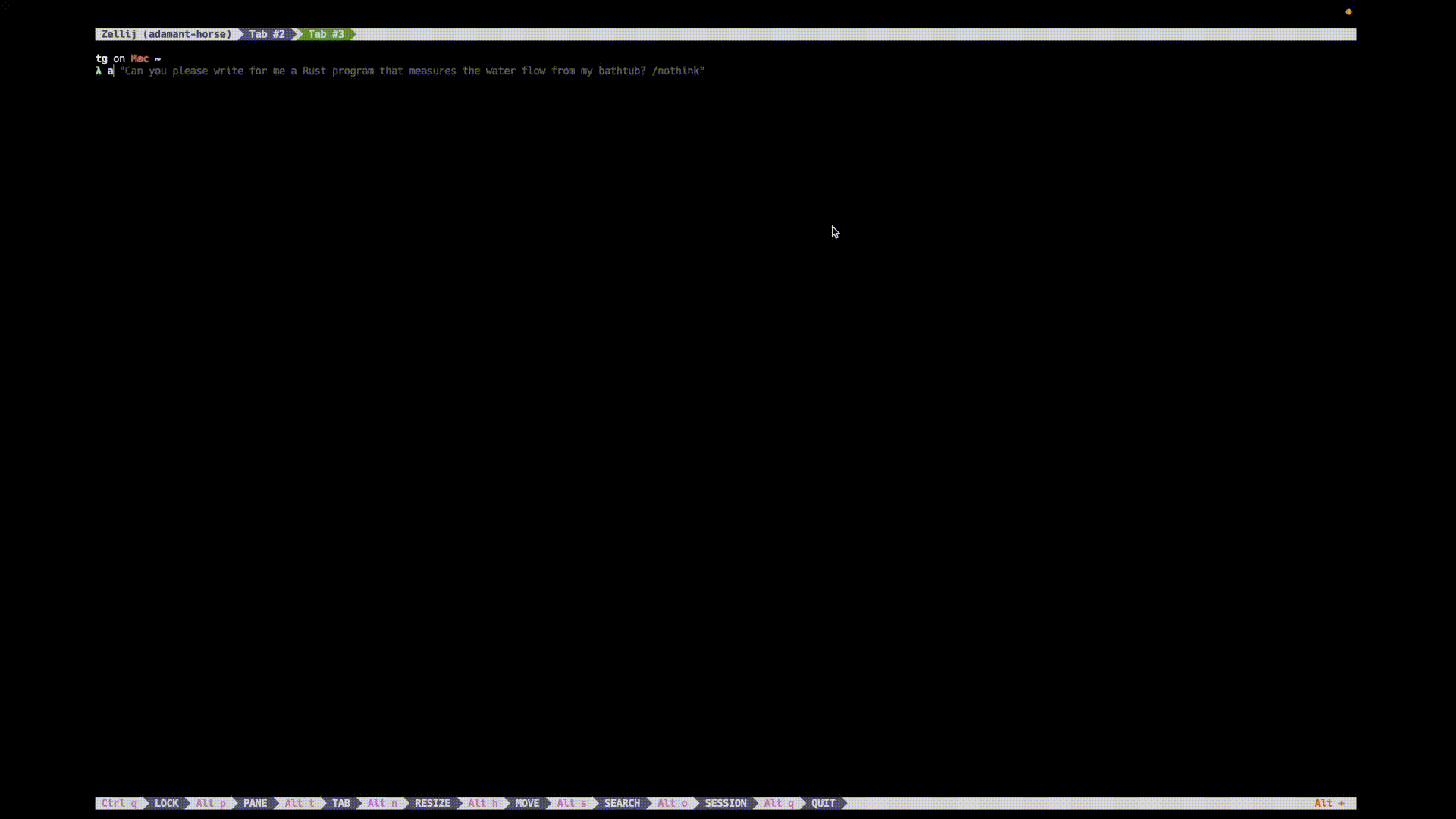Moldable Outputs 🧪🧱
Make aj’s output feel at home in your terminal: render Markdown with code blocks and syntax highlighting, keep a recent transcript, and customize behavior per shell.

🙀 This page includes ready-to-use helpers for Nushell, bash, and zsh.
🐚 Nushell (author’s version)
Drop this in ($nu.data-dir)/scripts/aj.nu and source it (or add use in your config).
export def a [text: string] {
$env.RUST_LOG = ""
rm -f ~/.cache/aj.history
let question = $text
aj ask -t default -s default $text | tee { save ~/.cache/aj.history }
clear
print $"($question)\n\n"
mdcat ~/.cache/aj.history
}
export def ai [session: string] {
aj i -t refactor_rust -s $session
}
Usage:
a "explain lifetimes with a tiny code example"
ai refactor-session-1
💡 Tip: mdcat renders Markdown beautifully with fenced code blocks. If you don’t have it, install via your package manager (e.g., Homebrew:
brew install mdcat). Alternatives:glow,bat -l markdown.
🧼 bash
Add this to ~/.bashrc (then source ~/.bashrc). It mirrors the Nushell flow:
- clears any old transcript
- asks with a chosen template/session
- saves raw output to
~/.cache/aj.history - clears the screen
- prints the prompt you asked
- pretty-renders the Markdown transcript
# aj: ask and pretty-print Markdown response
ajmd() {
export RUST_LOG=""
mkdir -p "$HOME/.cache"
rm -f "$HOME/.cache/aj.history"
local question
question="$*"
if [ -z "$question" ]; then
echo "usage: ajmd <question...>" >&2
return 2
fi
# Run once, save transcript
aj ask -t default -s default "$question" | tee "$HOME/.cache/aj.history" >/dev/null
# Present nicely
clear
printf "%s\n\n" "$question"
if command -v mdcat >/dev/null 2>&1; then
mdcat "$HOME/.cache/aj.history"
elif command -v glow >/dev/null 2>&1; then
glow -p "$HOME/.cache/aj.history"
elif command -v bat >/dev/null 2>&1; then
bat --paging=never -l markdown "$HOME/.cache/aj.history"
else
# Fallback without highlighting
cat "$HOME/.cache/aj.history"
fi
}
# aj interactive with a handy default refactor template
ajrepl() {
local session="$1"
if [ -z "$session" ]; then
echo "usage: ajrepl <session-name>" >&2
return 2
fi
aj i -t refactor_rust -s "$session"
}
Examples:
ajmd "write a tiny Rust iterator adapter and test"
ajrepl refactor-session-2
🌀 zsh
Add this to ~/.zshrc (then source ~/.zshrc). Same behavior as bash.
# aj: ask and pretty-print Markdown response
function ajmd() {
export RUST_LOG=""
mkdir -p "$HOME/.cache"
rm -f "$HOME/.cache/aj.history"
local question
question="$*"
if [[ -z "$question" ]]; then
print -u2 "usage: ajmd <question...>"
return 2
fi
aj ask -t default -s default "$question" | tee "$HOME/.cache/aj.history" >/dev/null
clear
printf "%s\n\n" "$question"
if (( $+commands[mdcat] )); then
mdcat "$HOME/.cache/aj.history"
elif (( $+commands[glow] )); then
glow -p "$HOME/.cache/aj.history"
elif (( $+commands[bat] )); then
bat --paging=never -l markdown "$HOME/.cache/aj.history"
else
cat "$HOME/.cache/aj.history"
fi
}
# aj interactive with a handy default refactor template
function ajrepl() {
local session="$1"
if [[ -z "$session" ]]; then
print -u2 "usage: ajrepl <session-name>"
return 2
fi
aj i -t refactor_rust -s "$session"
}
Examples:
ajmd "explain pinning in Rust with a minimal example"
ajrepl rust-notes-1
💡 Notes & Tips
- Template & Session: Change
-t default -s defaultto any template/session you prefer (e.g.,-t reading_buddy, -s gita-study). - History location: Adjust
~/.cache/aj.historyif you want per-session files (e.g.,~/.cache/aj.$(date +%s).md)or per-template logs. - Renderers:
- mdcat → rich Markdown (links, tables, code fences)
- glow -p→ pager mode
- bat -l markdown → quick highlighting (no Markdown rendering)
- Paging: To page long outputs, pipe to
less -R:mdcat ~/.cache/aj.history | less -R
- Noise-free:
RUST_LOG=""silences Rust log output so your Markdown stays clean.
🎛️✨ Have fun molding outputs to your terminal flow!